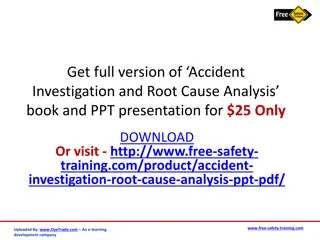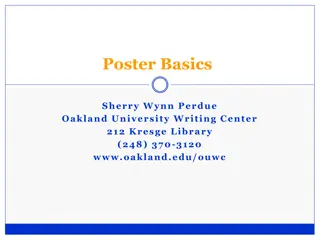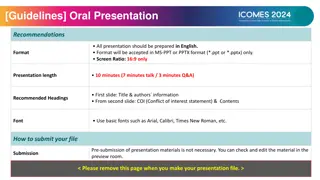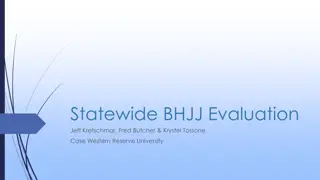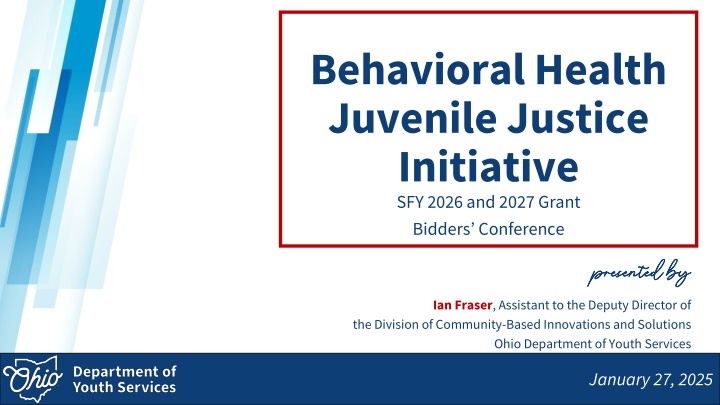
Youth Behavioral Health and Justice Initiative Overview
Explore the Youth Behavioral Health and Justice Initiative, a collaborative effort by OhioMHAS and DYS to address the needs of youth with emotional disturbances and substance use disorders. Learn about the initiative's goal to reduce out-of-home placements and commitments by enhancing local care systems.
Download Presentation

Please find below an Image/Link to download the presentation.
The content on the website is provided AS IS for your information and personal use only. It may not be sold, licensed, or shared on other websites without obtaining consent from the author. If you encounter any issues during the download, it is possible that the publisher has removed the file from their server.
You are allowed to download the files provided on this website for personal or commercial use, subject to the condition that they are used lawfully. All files are the property of their respective owners.
The content on the website is provided AS IS for your information and personal use only. It may not be sold, licensed, or shared on other websites without obtaining consent from the author.
E N D
Presentation Transcript
Behavioral Health Juvenile Justice Initiative SFY 2026 and 2027 Grant Bidders Conference presented by presented by Ian Fraser, Assistant to the Deputy Director of the Division of Community-Based Innovations and Solutions Ohio Department of Youth Services January 27, 2025
Welcome and Introductions: Ian Fraser ODYS Assistant to the Deputy Director of the Division of Community- Based Innovation and Solutions Alaina Deighan OhioMHAS Deputy Director, Office if Community and Family Resiliency Corey Shrieve ODYS Bureau Chief, Bureau of Community Reinvestment Jim Hearns ODYS Subsidies Manager, Bureau of Community Reinvestment 2 of 24
Key Dates: 6 January 2025 Release of request for Proposals (RFP) 27 January 2025 Virtual Bidder s Conference (10:00 am to 11:00 am) After today any questions will be referred back to the RFP document. 25 April 2025 Responses to RFP Due no later than 5:00 pm Responses to the RFP must be submitted electronically to BHJJ@dys.ohio.gov. 3 of 24
Behavioral Health Juvenile Justice Initiative Overview: Over 20 years ago it was noted that youth with serious emotional disturbances and/or substance use disorders were being committed to ODYS facilities in greater numbers than expected. It appeared that, in many cases, limited local resources to support evidence-based/informed practices for this population resulted in commitments driven by lack of options/alternatives. To address this need OhioMHAS and DYS combined their resources and developed a collaborative funding and grant management structure targeted at meeting the unaddressed needs of this population at the local level. 4 of 24
Behavioral Health Juvenile Justice Initiative Overview: The BHJJ initiative was created to foster the development and/or enhancement of more integrated and comprehensive local systems of care approaches to meet the complex needs of youth who were involved with both the behavioral health and juvenile justice systems. The stated intent of the BHJJ initiative was to reduce the use of costly and often ineffective out-of-home placements and commitments to DYS by increasingly the availability of and/or access to appropriate services/supports that would allow youth to remain safely in the community. 5 of 24
Adjustments Over Time: Encouraged increasingly the availability of and/or access to appropriate services/supports for marginalized and over-represented groups within the Juvenile Justice population. Included youth with Behavioral Health needs who are at risk for involvement with the Juvenile Justice system. Expanded to allow for services to families of youth living in non-carceral out-of-the-home placements with the intent of expediting a youth s return and/or to facilitate a successful return from an out-of-home placement. 6 of 24
Adjustments Over Time: Allowed the funding of promising practices. Identifying Community Corrections Facilities (CCFs) as a target for reduced admissions for youth with Behavioral Health needs. With the advent of OhioRise many of the evidence-based/informed services traditionally supported/sustained through BHJJ are now funded through Medicaid. 7 of 24
Requirements: MUST identify a Juvenile Court as the administrative and fiscal agent. MUST involve a partnership that includes the Juvenile Court(s), the ADAMH Board(s), and at least one community provider. MUST commit to participate in Project evaluation conducted by CWRU. 8 of 24
Target Population: Age(s) Race(s) Sex(s) OYAS risk level at intake CANS care coordination level at intake Behavioral health needs Juvenile justice needs 9 of 24
Expected Outcomes: Goals Youth remain in the community. Youth are provided with the opportunity to participate in evidence-based/informed or promising practice(s) intended to improve or stabilize behavioral health and/or functioning. Youth who successfully complete the service(s) provided will have lower rates of future juvenile justice involvement than those who do not complete successfully or who do not receive the service(s). 10 of 24
Expected Outcomes: Definitions Successful termination. Neutral termination. Unsuccessful termination. 11 of 24
Project Description: Clearly indicate services/supports provided using grants funds. Why selected including research citations. Type, frequency, and duration of family involvement. Strategies to establish and maintain youth and family engagement. Description of additional services/supports to be included but not covered by the grant. Graphic model/flow chart of Project. 12 of 24
Project Partnership: How Court is qualified to serve as administrative/fiscal agent. Role of the ADAMH(S) Board(s). Qualifications of provider to deliver the proposed service/support. If applicable, experience implementing BHJJ or similar projects. If applicable, how OhioRISE care coordinator will be engaged. Project will convene at least quarterly local meetings. Partners will attend periodic statewide meetings. 13 of 24
Quality Assurance: Describe internal processes to monitor effectiveness. Describe external fidelity, adherence, and outcome measures established by model developer. 14 of 24
Budget: Projected total cost and cost per year. Projected total Medicaid reimbursement and projections per year. Projected total insurance reimbursement and projections per year. Projected total local match and projections per year. 15 of 24
Budget Program Narrative Forms: Attachment 1- BHJJ_SFY2026-2027 Budget Forms 16 of 24
Statements of Assurance: Assurance that these grant funds will not supplant current local, state and federal funds for current service activities. Assurance that the respondent will pursue appropriate first- and third- party payers and will work with the State in securing non-grant funding for this project. Assurance that indirect costs (incurred by the Administrative/Fiscal agent) associated with this grant will not exceed 7%. Assurance that the project partners will work with ODYS, OhioMHAS, and the Case Western Reserve University evaluation team in participating in an independent process and outcomes evaluation of the project. This will include adhering to data collection/submission protocols as outlined by DYS, OhioMHAS, and the Case Western Reserve University evaluation team. 17 of 24
Statements of Assurance: Assurance that the project partners will convene at least quarterly project partnerships meetings that will include, at a minimum, representative from the Court, the Board, partner services providers, OhioMHAS, ODYS and the Case Western Reserve University evaluation team. Assurance that project partners will participate in periodic statewide Behavioral Health Juvenile Justice Initiative meetings. At a minimum, representatives from the Court, the Board, partner services providers are expected to participate. Assurance that, if the youth is receiving Care Coordination through OhioRise, that the Care Coordinator shall be invited to participate in meetings of the local BHJJ team. 18 of 24
Regarding awards we reserve the right to: make no award make an award for a lesser amount make an alternative award for the specified project make an award for a shorter duration Issue conditional awards ask clarifying questions negotiate a best and final proposal with one or more applicants(s). waive errors and omissions that do not materially affect the proposal 19 of 24
Awards: Awards are contingent upon funding availability and final funding approval. Errors and omissions may also result in lower evaluation scores or rejection of the proposal. Final awards will, in part, depend on the number and quality of responses received. 2 0 of 24
Key Dates: 6 January 2025 Release of request for Proposals (RFP) 27 January 2025 Virtual Bidder s Conference (10:00 am to 11:00 am) After today any questions will be referred back to the RFP document. 25 April 2025 Responses to RFP Due no later than 5:00 pm Responses to the RFP must be submitted electronically to BHJJ@dys.ohio.gov. 21 of 24
Questions: After today all questions will be referred back to the RFP document. 22 of 24
Thank you: 25 April 2025 Responses to RFP Due no later than 5:00 pm Responses to the RFP must be submitted electronically to BHJJ@dys.ohio.gov. 23 of 24
Follow and Chat with us: Visit: www.dys.ohio.gov 24 of 24













